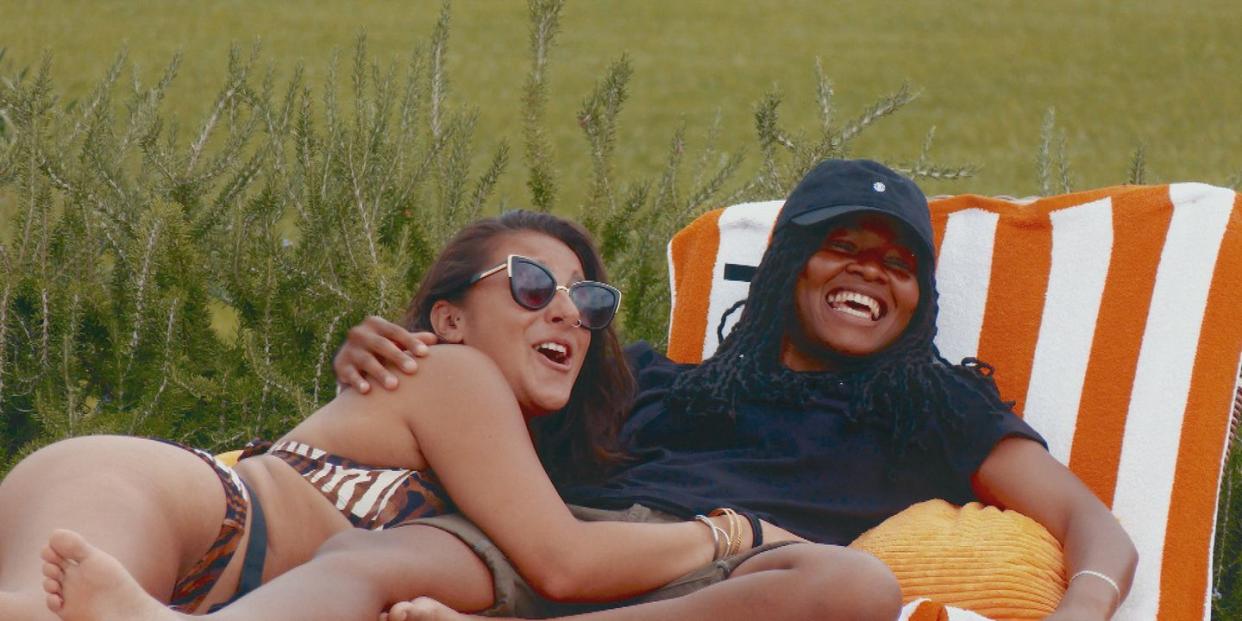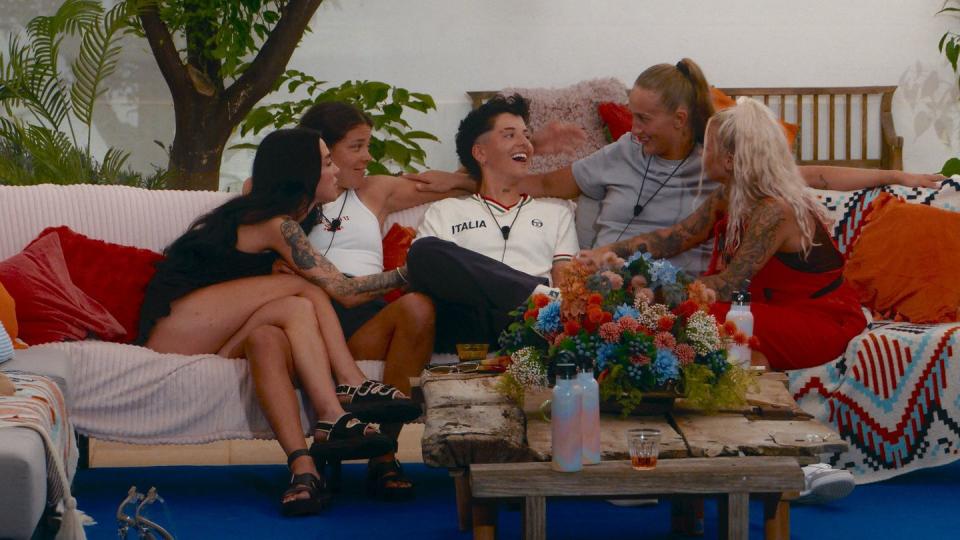I Kissed A Girl: ‘Finally! The reality dating show we deserve’

For better or worse, when it comes to reality dating shows, producers never seem to run out of ideas. It doesn’t matter that most new shows are essentially just a twist on the last – hot people in a villa; hot people on the beach; hot people banned from hooking up with other hot people; and, er, two shows about marrying someone you’ve never met. Well, it doesn’t matter to production companies, anyway. Audiences, meanwhile, have started to sour on these homogeneous reality dating shows. And yet, despite their apparent overexposure, viewers still can’t get enough. But, as a queer person, I resent how they tend to prioritise marriage above all else, reinforce extreme beauty standards, and play host to often-misogynistic behaviour by contestants – not to mention their painful heterosexuality.
So, when I heard about the BBC’s new sapphic dating show, I Kissed A Girl (IKAG), I was simultaneously excited and hesitant. The series is a spin-off itself – technically of a queer format (last year’s I Kissed A Boy, the UK’s first ever gay dating show), but, more accurately, of Love Island. How different was this really going to be?
That question was answered within the first 10 minutes. As each contestant was introduced, viewers got a parade of diverse queer women; we’re talking tall femmes, short mascs, soft mascs, studs, and stems. When each pairing strolled up to the villa – sorry, masseria – for their first kiss (the premise demands that each contestant kiss a complete stranger on arrival), I found myself giddily kicking my feet and giggling on my sofa, wondering if this is how straight people feel when they watch Love Island.
But it’s not just the sexual preferences that differentiate IKAG from Love Island; it’s also because the contestants’ approach to dating varies wildly from its straight predecessors. When contestants say, “let’s have a chat”, they actually… have a chat. They’re (mostly) transparent about their feelings, which makes their later head-turning less of a betrayal. Case in point: Fiorenza has twice been totally candid when letting her love interests know where her mind is – first Meg, then Beth – as soon as she’s noticed her head being turned. Each housemate is also quick to offer support and advice, with some – like the stable couple Priya and Naee – even taking on a parental role to guide fellow contestants together. It’s clear, then, from their constant communication and camaraderie that we can all learn a lot about love from IKAG.
Ofc, reality shows don’t exist in a bubble; they often reflect our own dating habits. One that became clear from Love Island was our collective tendency to go for partners who are our ‘type on paper’. A habit that can lead us to pigeonholing our romantic potentials and missing out on people who don’t meet our visual requirements but who might be kind, funny, and share our interests. IKAG rips up this rule book. Take Amy, for example. When she entered the masseria stating she’s “femme for femme”, it seemed like she wasn’t going to budge from this rhetoric. But after bonding with soft masc Eva, she quickly learned that vibes were more important than aesthetics. While the masc-presenting Fiorenza, Amy’s long standing crush, is far from her femme type but it’s her energy that she’s attracted to. Amy’s track record in the competition since shows her growth, as well as the importance of exploring beyond your type to find love.
The main reason I love watching IKAG, though, is because of how ebullient it is. Although they’re in the masseria to find love, the sunkissed houseguests are having so much fun, it feels more like a big gay holiday than a competition. When the girls aren’t having deep chats – or deeper kisses – they’re having a laugh by the pool or unpacking their experiences as queer women. Any glance at their socials now, eight months since filming, shows that they’re often socialising with one another, suggesting that the contestants built real friendships, too. Demi was the first to leave the show (as she was left unkissed), but even though she’s new to the queer scene, she wasn’t wounded by the rejection. Rather, her exit signalled the excitement that’s carried on from episode to episode. “I feel a lot more secure in my sexuality, and I got to meet a bunch of fit girls,” she said in her goodbye to the others. “I’ve got a cool queer group [now]. Honestly, I don’t regret anything.”
At a time when dating apps are so ubiquitous that we don’t tend to date our friends anymore, IKAG offers a good argument for why we should. It shows that by avoiding this dynamic, we might be missing out on some of our closest connections. There’s a cliché in the lesbian world that friends quickly turn to lovers and exes turn to other people’s exes, in part due to the close knit nature of the queer community, but this is no bad thing. In fact, IKAG proves that straight people are missing a trick, as the strongest pairings on the show seem to be growing out of supposedly platonic connections. This might seem messy to those who are hesitant about muddying the waters of friendship, but perhaps if more of us took the risk, we might find romance and friendship simultaneously.

Of course, it’s worth remembering that while IKAG may be an improvement from previous reality dating shows, it’s still reality TV. The series is still made for entertainment, so, yes, there’s bound to be tears. But it often feels like the contestants are immune to producers’ drama-making tricks. It’s particularly funny to watch the teaser clips, which are edited to give the desired dramatic effect, compared to what the next episode actually has in store. When Lisha and Abby hit the rocks – after being one of the show’s most consistent couples – the teaser hinted at explosive drama that never actually reached the height producers may have hoped for, because the pair actually talked through their issues (what a concept!).
IKAG not only finally gives queer women the space on national TV that we deserve, but its honest contestants are helping to heal the wounds reality TV has inflicted. It goes to show that dating shows don’t have to be manipulative to be worth watching, and, more importantly, that when people commit to consistent communication, a lot of unnecessary harm can be prevented. Sure, relationships will still be messy, but the heartbreak hearts a little less when you’ve got your mates to get you back on your feet. At a time when dating apps have sucked all the fun out of dating, it’s simply a joy to watch a group of women who are excited to get to know each other, wherever that may lead.
You Might Also Like

